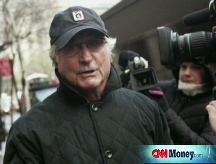Congress looks for answers in Madoff scandal
Lawmakers ask how regulators missed the alleged $50 billion Ponzi scheme.
NEW YORK (CNNMoney.com) -- Lawmakers took a hard look Monday at the alleged $50 billion investment scam engineered by Bernard Madoff that has sent shock waves across the nation's already fragile financial system.
At a hearing held by a House Financial Services subcommittee, lawmakers largely focused on how Madoff managed to evade detection for so long and whether gaps in regulation allowed him to carry out his alleged multi-billion Ponzi scheme.
"Before we act we need to understand how Mr. Madoff organized his many business operations and how he perpetrated his alleged fraudulent acts," said Paul Kanjorski, D-Penn, the chairman of the subcommittee.
A large part of that blame was reserved for the nation's leading investor protection agency - the Securities and Exchange Commission.
Regulators were reportedly alerted numerous times over the years by outsiders that Madoff's ability to deliver steady, double-digit returns was nothing more than smoke and mirrors.
The SEC and other regulators, including the Financial Industry Regulatory Authority, a non-government agency that oversees all securities firms, investigated Madoff's firm at least eight times over the past 16 years, the Wall Street Journal reported Monday.
But those inquiries failed to yield any clues about his Ponzi scheme, which reportedly fleeced investors out of as much as $50 billion. In a Ponzi scheme, money from new investors is used to pay off early investors, giving the appearance of returns.
Since he was charged by federal authorities in mid-December, the SEC has launched its own internal investigation into how Madoff's alleged actions were able to continue unchecked for at least 10 years.
H. David Kotz, the SEC's inspector general, told Congress Monday that the investigation was ongoing. He added that his office planned to look at, among other things, complaints about Madoff's activity and any other conflicts of interest between SEC officials, its staff and members of Madoff's family.
"I am not in a position to provide any conclusions or findings with regard to the allegations that have been raised," Kotz said in his prepared remarks. "I can assure you our investigation and review will be independent and as hard-hitting as necessary."
Underlying Monday's hearing was the ongoing debate between lawmakers about whether the Madoff scandal and broader fallout in the financial system warrants new legislation or whether existing regulations need to be used more effectively.
"What we may have in the Madoff case is not necessarily a lack of enforcement and oversight tools, but a failure to use them," said Spencer Bachus, R-Ala.
Meanwhile in New York, prosecutors were seeking to revoke Madoff's bail Monday, arguing that he violated the terms of his release, including trying to mail expensive jewelry to members of his family. A federal judge had made no decision on the matter as of Monday afternoon.
Madoff remains in his Manhattan apartment under 24-hour house arrest. His $10 million bail was secured by properties owned by Madoff and his wife, including the Manhattan apartment and a Palm Beach estate.
If convicted by federal authorities, Madoff faces a maximum penalty of 20 years in prison and a $5 million fine.
Madoff's alleged Ponzi scheme has reached far and wide, touching major financial institutions overseas, including Spain's Banco Santander (STD) and Britain's HSBC (HBC), tony communities like Palm Beach and members of Hollywood's elite, such as film director Steven Spielberg and actor Kevin Bacon.
But the scandal has also rippled through Main Street, hitting pension funds and individual investors.
Allan Goldstein, a 76-year-old former textile salesman from upstate New York, told lawmakers in prepared testimony Monday that his entire life savings, which was worth as much as $4.2 million just months ago, has vanished. Having cashed in his life insurance policy to pay his mortgage, Goldstein said he feared he and his wife might face foreclosure on his home.
"We are not trust funds, hedge funds or banks," said Goldstein. "We are ordinary people who are victims of an incomprehensible crime and who have had their lives turned upside down."
There are signs that the number of victims from the Madoff scandal could reach into the thousands. Irving Picard, who was appointed by a federal judge to handle the liquidation of Madoff's brokerage firm and recover any assets, had mailed claims forms to more than 8,000 investors.
So far, efforts have recovered only $29 million in funds from Madoff's firm. Stephen Harbeck, president of the Securities Investor Protection Corporation, an agency authorized by Congress to help investors at failed brokerage firms, said in testimony Monday that an additional $830 million has been identified and that Picard is seeking to recover those assets as well. ![]()


